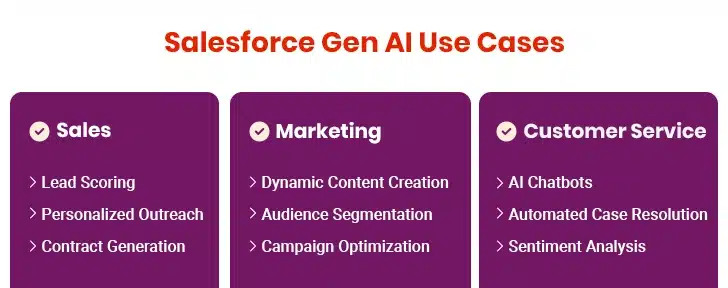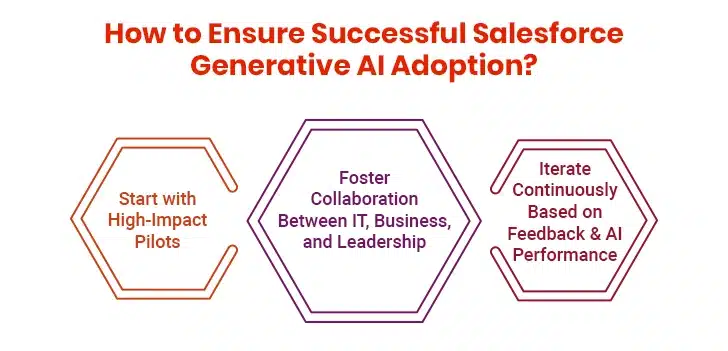Generative AI is changing how businesses work. Organizations want to use its power to improve customer experiences and streamline operations. Yet, many lack the foundational knowledge to deploy AI safely and effectively.
Salesforce helps businesses close the gap. Its Gen AI ecosystem combines prebuilt AI models, easy customization options, and governance frameworks. It enables teams to embed intelligent automation into daily tasks. The platform’s emphasis on ethical AI practices keeps data safe while earning customer trust.
This comprehensive playbook equips practitioners with everything they need to know about Salesforce’s Generative AI ecosystem. The foundational knowledge in this piece helps teams succeed with AI adoption, whether they start with small pilot projects or expand across departments.

Table of Contents
Understanding Salesforce Gen AI
Upskilling for Salesforce Gen AI: Pathways for Practitioners
Practical Applications of Salesforce Gen AI
How to Implement Salesforce Gen AI (Step-by-Step Guide)
Overcoming Challenges in Salesforce Generative AI Implementation
Best Practices for Successful Salesforce Gen AI Adoption
Understanding Salesforce Gen AI
Salesforce’s Generative AI ecosystem represents a blend of proprietary technology and third-party tools. Einstein GPT serves as its foundation, combining Salesforce’s private AI models with external large language models (LLMs) like OpenAI’s ChatGPT to process customer data and generate personalized content. Einstein GPT differentiates itself through its ability to create AI-generated content that continuously adapts to changing customer information.
This ecosystem has several interdependent/interconnected components. Einstein Copilot (which is now rebranded as Agentforce) serves as an AI assistant natively integrated into Salesforce applications. Users can engage with the assistant using natural language to generate content, receive recommendations, and automate tasks.
Central to Salesforce’s Gen AI implementation is the Einstein Trust Layer, which establishes an industry standard for enterprise AI security. This layer prevents large language models from retaining sensitive customer information, addressing a critical concern in AI adoption. The Einstein Trust Layer includes features like data masking and toxicity detection to ensure responsible AI use.
Salesforce has designed its Gen AI implementation to be both powerful and flexible. Organizations can choose between using Salesforce’s proprietary AI models, leveraging the OpenAI partnership, or bringing their own external models. This open, extensible approach allows businesses to customize their AI implementation based on their specific needs.
Upskilling for Salesforce Gen AI: Pathways for Practitioners
Success with Salesforce Generative AI implementation depends on practitioners mastering specialized skills. As AI adoption speeds up, Salesforce is scaling its AI capabilities to meet growing global demand. This has driven the need for trained consultants. To keep pace, organizations must upskill teams in AI implementation, governance, and ethical best practices.
1. Key Skills to Master
- Prompt Engineering: Prompt engineering has become a simple yet crucial skill to use AI effectively. It helps craft specific questions and commands that generate desired responses from language models. Getting good results requires clear context, specific requests, and breaking complex tasks into step-by-step instructions.
- Data Governance: Data governance forms the foundation of responsible AI implementation. With global regulations getting stricter, practitioners must master three critical components:
- Data masking to protect sensitive information during development
- Centralized compliance management to handle privacy regulations
- Resilient backup systems to safeguard critical data
- Ethical AI Practices: Salesforce’s Office of Ethical & Humane Use guides responsible AI development. Their frameworks ensure AI products stay unbiased, prevent discrimination, and maintain transparency. Practitioners must understand bias mitigation, fairness principles, and accountability measures.
2. Salesforce’s Learning Resources
Trailhead, Salesforce’s free online learning platform, provides a structured pathway to master AI skills critical for CRM innovation. The platform features modules on Generative AI basics, responsible AI creation, natural language processing, and AI fundamentals. In addition, there are specialized trails to build skills in Generative AI, data analysis, change management, and data governance.
Salesforce certifications validate practitioners’ AI expertise in clear, measurable ways. The AI Associate certification, for example, helps build foundational skills in ethical data handling for AI in CRM. More advanced practitioners can pursue the Agentforce Specialist certification, which focuses on managing Agentforce in organizations.
Practical Applications of Salesforce Gen AI
Companies across industries are adopting Gen AI in Salesforce to solve unique challenges and discover new opportunities. This shows the impact of these technologies in addressing real-life scenarios.

I. Sales: AI-Driven Lead Scoring, Personalized Outreach, and Contract Generation
AI-powered predictive lead scoring analyzes past interactions, purchase patterns, and engagement levels to rank leads by their conversion potential. This allows sales teams to focus on high-value prospects and close more deals. Companies can now create detailed customer profiles by combining data from multiple sources. These profiles show customer priorities, behaviors, and demographics that were hard to compile a few years back.
AI-driven email tools create custom messages based on user priorities, browsing behavior, and past purchases. These tools also optimize delivery timing to boost open rates. Contract generation becomes smoother too, as Gen AI helps draft agreements and track renewals.
II. Marketing: Dynamic Content Creation, Audience Segmentation, and Campaign Optimization
Marketers use Gen AI to scale content personalization. AI creates customized email subject lines, body copy, and SMS messages for different target audiences. This improves user engagement.
Salesforce AI (or Einstein) analyzes customer behavior to spot patterns and trends in audience segmentation. It groups customers based on their demographics (age, gender, income) and psychographics (lifestyle, values, interests). These segments get auto-updated as new data comes in. This classification allows businesses to allocate resources more effectively by targeting specific groups with relevant offers.
Campaign optimization gets a major boost from AI predictive models that forecast customer behaviors—will they convert, churn, or engage with specific campaign elements? These models run A/B tests on campaign elements and create custom reports. These reports offer stakeholders clear visibility into performance metrics.
III. Customer Service: Intelligent Chatbots, Automated Case Resolution, and Sentiment Analysis
Gen AI helps organizations transform customer support. Intelligent chatbots now handle many customer service tasks. They answer questions, troubleshoot issues, and recommend products. These assistants resolve a significant portion of customer inquiries autonomously. This reduces operational costs. It also allows human agents to work on complex issues that demand empathy or adaptability. Besides, AI can suggest questions that help identify root causes faster. This lets agents speed up resolution.
Perhaps the most valuable use case is sentiment analysis, which tracks customer tone and emotion in real time. This helps with more effective resource allocation: senior agents handle high-stakes interactions while new employees avoid burnout from hostile exchanges.
How to Implement Salesforce Gen AI (Step-by-Step Guide)
Implementing Gen AI in Salesforce needs a structured approach with distinct phases to ensure proper integration and maximum value. These include:
Phase 1: Planning and Strategy
Organizations must first check their data readiness. Their data should be accurate, accessible, and securely governed. Poor data quality can hinder AI implementation. Before moving forward, they should complete these key assessments:
- Data Quality Evaluation: Find and fix incorrect, corrupted, or incomplete data
- Infrastructure Assessment: Ensure the technology stack can support AI workloads
- Trust Framework Establishment: Set ethical guidelines and security protocols to protect sensitive information
A well-designed technology solution creates the foundation for successful AI adoption. Organizations should start by aligning with leadership about what they want from Gen AI implementation. They should create a framework that limits governance to necessary personnel only.
Maximize Your Salesforce ROI with Intelligent Solutions
Phase 2: Integration and Configuration
Integration and configuration begin after planning. Salesforce provides multiple options for implementing AI models.
- Use Salesforce’s proprietary AI models built specifically for CRM use cases.
- Partner with OpenAI to combine Salesforce data with powerful language models.
- Bring your own models or BYO LLM to fulfil specialized needs.
Throughout the implementation process, the Einstein Trust Layer ensures the privacy and security of sensitive information. At this stage, Prompt Builder can be used to create, test, and refine AI prompts. These prompts can then be integrated across the Salesforce platform.
For effective configuration, customize prompt templates through these steps:
- Define resources for grounding in Salesforce data
- Build prompt templates (text, field generation, or chat completion)
- Test and improve prompts until satisfactory results are achieved
Phase 3: Testing and Optimization
The final phase involves rigorous testing and continuous optimization. SF Eval offers a comprehensive framework to assess the performance of AI models. It combines traditional machine learning metrics with AI-assisted metrics.
Once the initial assessment is complete, a systematic approach can be implemented to evaluate and improve prompts. This ensures the prompts used are continuously refined for clarity, relevance, and effectiveness.
For continuous improvement, it’s essential to track key performance indicators through Salesforce Analytics dashboards. Teams can monitor metrics such as lead conversion rates, time saved on repetitive tasks, and customer resolution times. When a pilot proves successful, it can be expanded to other departments through a gradual, strategic rollout.
Overcoming Challenges in Salesforce Generative AI Implementation
Gen AI in Salesforce shows great promise. However, companies face several roadblocks when implementing AI.
I. Data Quality Issues
Organizations lose an average of $12.90 million due to poor data quality. This makes data quality the biggest problem in Salesforce Generative AI implementation. High-quality, consistent data forms the foundation of any reliable AI system.
- Age: Old, outdated data weakens AI prediction accuracy
- Completeness: Gaps in data hinder comprehensive analysis
- Accuracy: Flawed data fuels unreliable results
- Consistency: Messy, inconsistent formatting leads to wrong insights
- Duplication: Multiple entries of the same records distort analytics
Moving data from old systems adds more complexity. These old systems often contain unstructured, inconsistent, or duplicate data that must be cleaned up to fit Salesforce’s data model.
II. User Adoption
Here’s something troubling: While 83% of C-suite leaders say they know how to use generative AI safely, only 29% of individual contributors share this confidence. To make matters worse, a majority of service workers admit they don’t know how to get the most value from Gen AI at work.
To ensure success, teams must conduct tailored training programs that adapt to each user’s skill level. Employees are more likely to use systems that cut down their manual work. Using AI to automate boring tasks like data entry boosts adoption rates.
III. Ethical Concerns
Ethical concerns like AI bias aren’t theoretical—they’re tangible roadblocks. Around 73% of IT leaders worry about bias in generative AI.
To build trustworthy AI systems, organizations need four key elements:
- Human oversight
- Better security
- Trusted customer data
- Ethical use guidelines
Salesforce tackles these concerns through the Einstein Trust Layer that embeds protections like data anonymization, toxicity filters, and secure prompt handling to help mitigate risks from the start.
Expert consultants also play a crucial role in ethical implementation. These professionals translate business needs into ethically sound AI systems while following best practices for data privacy, security, and fairness. Their expertise turns ethical risks into opportunities for responsible innovation.
Best Practices for Successful Salesforce Gen AI Adoption

Achieving substantial cost savings through smart AI adoption doesn’t happen by chance— it requires strategic planning. To get the most from Gen AI implementation, organizations should follow proven frameworks and best practices, rather than relying on ad-hoc experiments
1. Start Small: Pilot High-Impact Use Cases First
Staggered implementation helps build momentum and minimizes risk. The most successful companies begin with low-risk use cases like content generation, report suggestions, or email drafting. Why these areas? Because they align with business goals and drive customer value. This approach allows teams to:
- Establish effective guardrails before roader rollout
- Gain confidence through quick wins
- Lower implementation risks while showing clear value
2. Promote Collaboration Between IT, Business Teams, and Leadership
Effective Gen AI adoption requires different teams to work together. Companies should get input from everyone involved—employees, customers, and partners—as they plan their implementation. This teamwork closes the gap between what’s technically possible and real business results.
How to get everyone on board? Hackathons, workshops, and open forums help team members understand AI better. Leaders must also create a clear AI roadmap that matches the company’s long-term goals.
3. Iterate Based on Feedback and AI Performance
Continuous feedback systems play a key role in success. Organizations can build robust feedback loops that capture user experiences and system performance. They can track performance metrics like accuracy, adoption rates, and task completion to identify gaps and refine workflows or prompts to tackle them.
Salesforce’s Central Evaluation Framework (SF Eval) streamlines this process. It evaluates AI outputs across diverse scenarios. This helps teams detect issues like bias, inconsistency, or hallucinations early. The best part is that by incorporating this feedback into ongoing development, organizations can make dynamic adjustments to AI models and prompts.
In short, optimizing Gen AI implementation requires ongoing monitoring and refinement as customer expectations change. This perpetual improvement cycle ensures your AI applications stay in line with business objectives.
The Future of Salesforce Generative AI
Salesforce’s Generative AI capabilities keep growing at an exponential pace. We’re moving toward a future where AI isn’t just an add-on but becomes woven into the fabric of core CRM functions.
The future versions of the platform will take personalization to unprecedented levels. The system will study customer interactions across multiple channels and find the best ways to engage with every individual. This will create a CRM experience that’s truly adaptive.
Industry-specific solutions will matter more. Banks will get specialized AI models trained to handle industry rules and spot fraudulent patterns. Similarly, healthcare providers will use tools built for patient care and coordination that follow HIPAA privacy rules. There will be pre-built templates to tackle every sector’s unique challenges.
Seamless integrations will unify ecosystems. Custom APIs will let businesses add third-party AI models or external data sources to their Salesforce setup. This will sync information between Salesforce and other platforms quickly, creating a centralized intelligence hub.
Finally, as technology advances, Salesforce’s Gen AI will focus on managing complex workflows across departments. This will break down traditional barriers between marketing, sales, and service teams. The result? More coherent customer experiences from the first touch to ongoing support.
That’s a Wrap
Salesforce Gen AI transforms how organizations manage customer relationships and operations. Many organizations face challenges with data quality and user adoption. Yet, those following a structured approach see impressive results.
Success hinges on three key elements. Practitioners must develop expertise in prompt engineering and data governance to create a solid foundation for effective AI use. In addition, they should launch focused pilots before scaling up. It’s also essential to continuously evaluate AI applications to ensure they remain aligned with business goals.
The journey to successful Gen AI implementation is no easy undertaking. It demands commitment and patience. Organizations that embrace this technology with the right approach secure a competitive advantage through better customer relationships, optimized operations, and improved decision-making.





